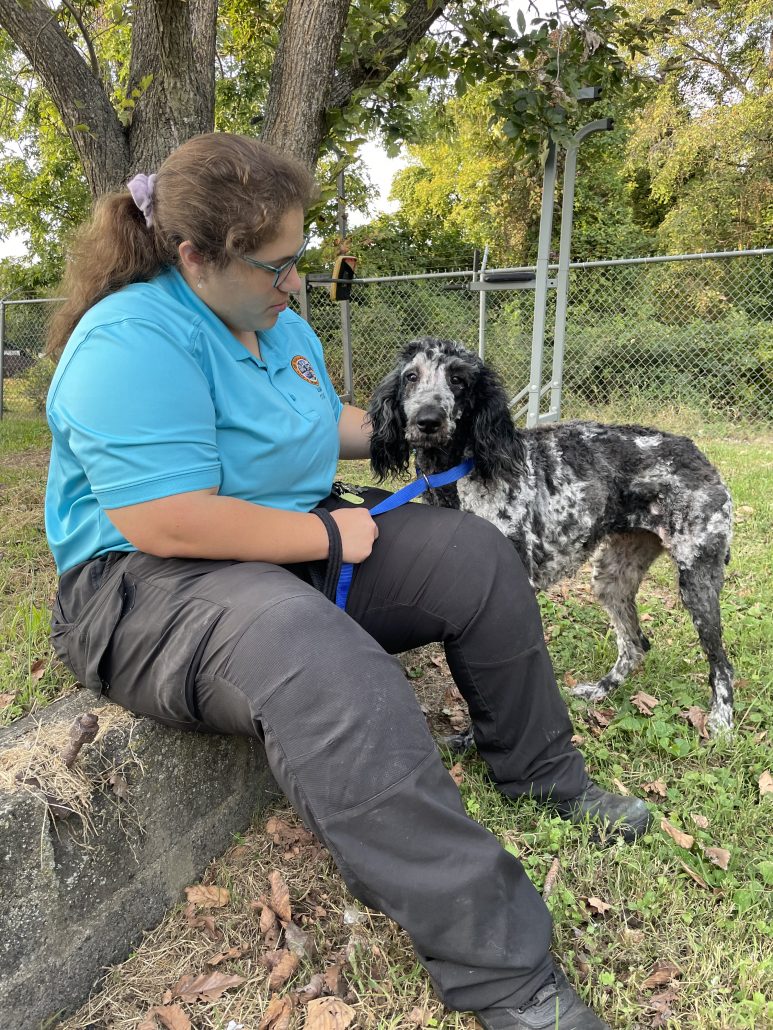by Stephanie Stullich
College Park Animal Control Officer Rebecca Bailey loves her job because it gives her the opportunity to help animals. “They don’t have a way to advocate for themselves”, she said. “I know I’m meant to do this job.”

Credit: Stephanie Stullich
An animal control officer (ACO) has a wide range of responsibilities: picking up stray pets; responding to complaints of neglect, cruelty, and code violations; handling sick or aggressive wildlife; and educating the public about animal care. Bailey commented, “There really isn’t a typical day. I can be reuniting a pet with its owner one day and rescuing wildlife the next – or all in the same day.”
Bailey has loved animals from an early age. “Sometimes people can be hard to please,” she said. “But all I have to do is take a dog for a walk, and that’s the happiest day of their life.”
College Park Department of Public Services Director Bob Ryan said that only five of the 27 municipalities in Prince George’s County have an ACO; College Park has had one for at least 30 years. Ryan said that while the term used in the profession is animal control, the work focuses at least as much on animal welfare.
The city has a small animal shelter where it temporarily houses rescued pets including dogs, cats, birds and bunnies. Bailey said her first priority each day is caring for any animals in the shelter, but she spends most of her time responding to calls for service — complaints about barking dogs, alerts about cats and kittens in need of rescue and dogs running at large. She always checks strays for identification, including microchips, and often asks residents to spread the word about rescued pets through social media.
Ryan said the city council and residents appreciate having an ACO who can respond to calls quickly. Bailey noted, “I’m usually just five to 15 minutes away.” Ryan also noted that having an AOC who knows the city and can develop relationships with residents is a significant advantage. County ACOs, in contrast, serve a much larger geographic area.
Pets rescued in College Park who are not reunited with their families may be put up for adoption. Bailey said, “the most beautiful thing about having a pet” is that “animals are so ready to love and be loved.” Aron Bender, 9, is in love with his newly adopted cat Luna, who was picked up as a stray in the Hollywood neighborhood, just six blocks from Bender’s home. “When I met Luna, I just knew I wanted her,” Aron said. “Having a cat is fun. Whenever I come in the room, she says ‘meow’ — when I play with her, she’s crazy. At night she sleeps with me.”
Bryan Draper initially considered fostering a single kitten but ultimately decided to adopt two of them because, as he said, “cats are meant to come in pairs, especially if they are young.” His kittens, Paco and Tipitina, love to play together, he said, adding, “[They have] frequent steeplechases through the apartment. I am so grateful they came to me!”
Bailey has community partners who help her in her work. Volunteers with the College Park Animal Welfare Committee assist Bailey in a number of ways, including staffing twice-yearly rabies vaccination and microchipping clinics and writing articles on animal issues for College Park’s “Municipal Scene” online magazine.
Bailey also works with ACOs in other nearby municipalities, especially Greenbelt, whose own ACO helps to cover the College Park shelter when she is on leave. A few months ago, a kitten from College Park and a second from Greenbelt were placed with a foster who volunteers for both cities; the two kittens bonded and were adopted out as a pair.
Other rescue groups often help with referrals and finding foster homes for adoptable pets. The Society for the Prevention of Cruelty to Animals (SPCA) of Anne Arundel County identified a foster placement for a disabled kitten that Bailey rescued in College Park’s Sunnyside neighborhood; his hind legs were paralyzed, but the foster knew how to handle that, and eventually the SPCA found him a purrfect home. In another recent case, Mid-Atlantic Poodle Rescue (MAPR) helped with a standard poodle who was surrendered to College Park. The dog had been neglected and had severely matted fur, but a sweet and loving personality. Bailey had a groomer address the matted coat, and MAPR placed him in a foster home and used their network to find him a forever home.
Bailey works particularly closely with Beltsville Community Cats (BCC), collaborating on trap-neuter-vaccinate-release (TNVR) efforts to humanely reduce the population of feral cats. The City of College Park and BCC also jointly operate a cat adoption center at the Laurel Petco, where they showcase College Park and Beltsville cats that are ready for adoption.
BCC president Sallie Rhodes said her group often receives calls about cats in College Park because people don’t know who to call; residents often don’t even know that College Park has an animal control officer. But, she said, “We coordinate really well; we make referrals to [Bailey], and she makes referrals to us.”
Bailey said, “With animal welfare jobs, community is what it’s all about. We all lean on each other and help however we can.”
College Park is always looking for volunteers to foster pets for a few days, weeks or months and to help with caring for cats in the Laurel Petco adoption center. For more information, contact College Park Animal Control Officer Rebecca Bailey at animalcontrol@collegeparkmd.gov or 240.375.3165.







